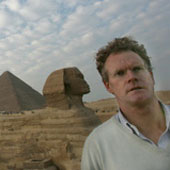Middle Eastern Police States
How much power do security agencies in the Middle East exercise in their countries?
May 6, 2009
In the decades since World War II, as military leaders or Middle East monarchs like Jordan's late King Hussein, the father of King Abdullah II, smothered democratic life, the security agencies amassed sweeping powers.
Since every autocrat depends heavily on the mukhabarat to squash opponents, no leader old or young is expected to dismantle those powers anytime soon. Weak governments find it far easier to compensate for their lack of a popular mandate by strengthening the secret police rather than opening up the system.
The security agencies have become a law unto themselves, their reach pushing far beyond security into politics, the media and business.
My Egyptian assistant and I were detained in late 2001 for loitering outside the Cairo headquarters of the secret police. (Our attention was focused on a school opposite its front door.)
After several rounds of questioning and demands for identification, one false release and a couple telephone calls to the Ministry of Information to confirm that we were legally registered journalists, we were eventually ushered into the office of a major.
He politely asked us in English to sit down, and as I did I noticed the wall behind his battered desk was hung with roughly ten diplomas from the FBI, including one for sharpshooting and another for interrogation.
"Is this an interrogation?" I asked brightly
"No, it's just tea," the major responded, grinning as an aide scurried in with small, sugary glasses of the stuff.
We had a brief, friendly conversation about my impressions of Egypt, during which the major assured us that he was only acting in his capacity of protecting the well-being of some 5,000 Americans residing in Egypt. Then he let us go. But in the years afterward, whenever I was involved in any reporting in Egypt that state security considered dubious, the major would call.
On one occasion I was out shopping for the latest underground tapes of sermons by extremist prayer leaders — and the cell phone rang. "What was on the tapes?" the major wanted to know. (Abeer, God bless her, told him, "Go buy your own!")
Outside the mass trial of some young Muslim Brothers, I got into a rare heated argument with some of their relatives. I generally tried to avoid arguments, but they got me going by defending Saddam Hussein's human rights record as not all that bad. (This was before the American invasion.) The major called to ask with whom I was arguing.
Sometimes he would call to suggest story lines, which we would diplomatically agree to consider in hopes it might diminish the scrutiny. I never actually took one up. I lived with the creepy feeling of being watched, though, or at least being watched around certain types of government opponents. All Egyptian employees of Western news organizations were put under even greater pressure.
I confess, however, that the vague connection with a major in the secret police periodically had its advantages. On a black, rainy night in a squalid village in the Nile Delta, for example, we tracked down the family of a senior Al-Qaeda operative whom the United States had killed in Afghanistan.
After some initial hostility, his brother and a few beefy friends agreed that I could interview them just as soon as we went with them to get permission from the mukhabarat headquarters in the village. We followed them in our car, wondering what might have prompted their sudden change in mood.
Nervously eying the darkened building behind a chain-link fence and the line-up of thugs with biceps the size of my thigh, we stalled inside the vehicle, quietly calling the major. Fortunately this was one time that he answered immediately. He told us that the local State Security building was in no such location.
We did a quick U-turn in the car and high-tailed it out of there as the thugs scrambled for their own vehicle. The goon squad remained in angry pursuit even after we skidded out onto the highway, the men leaning out the windows of the car, cursing and raising their fists at us.
Editor’s Note: This is the third part in a three-part series from Neil MacFarquhar’s book, “The Media Relations Department of Hizbollah Wishes You a Happy Birthday.” Copyright 2009 Neil MacFarquhar. Reprinted with permission of PublicAffairs Press.
Read Part II here.
Takeaways
On one occasion I was out shopping for the latest underground tapes of sermons by extremist prayer leaders — and the cell phone rang. "What was on the tapes?" an Egyptian major wanted to know.
Weak governments find it far easier to compensate for their lack of a popular mandate by strengthening the secret police rather than opening up the system.
Read previous
Talking About Jihad
May 5, 2009
